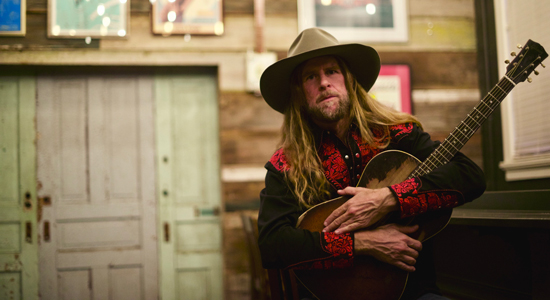
A less formal approach to writing and recording agrees with Grayson Capps
“On this collection I started with an empty mind, a guitar and the voice recorder on my iPhone,” says Grayson Capps, describing the creation of Scarlett Roses (Royal Potato Family), his seventh solo album. “I pressed record and freestyled a song. If I liked the outcome, I’d edit it and sand it down into something more concise.”
The 50-year-old Capps has been playing music for as long as he can remember, inspired by the impromptu living-room jam sessions he witnessed growing up. “I remember hearing Fred Stokes, a friend of my father’s, play his old Martin around the house when I was a child in Brewton, Ala.,” he says. “Bobby Long, another friend, and my dad sang along. The pure joy of those days surpassed any record or formal concert I ever heard and continues to inspire me to this very day.”
Capps was already writing songs when he moved to New Orleans to attend Tulane University as a theater major. When one of his teachers told him rock ’n’ roll was the future of theater, he gave up acting to play in two short-lived bands: the House Levelers, a folk/punk project, and Stavin’ Chain, a blues-rock outfit. He started his solo career with an eponymous album in 2005, promising himself that he’d release a new recording every year. After five years, and as many albums, he recalibrated his approach. He moved back to Alabama, set up a writing shed in his backyard and took six years to make Scarlett Roses. Capps is happy with this more leisurely method.
“My shack is small,” he says. “I have a desk, an old-school four-track recorder, an AC, a wood-burning stove and two guitar hooks. It’s very simple and allows me to have a clean slate when writing. Making this album was a new experience, from writing more free-form to discovering the fruit of my new surroundings to moving on from old swamps to more stable terrain.”
Once the songs were written, Capps took some friends into a studio with longtime producer Trina Shoemaker (Josh Ritter, Brandi Carlile) and cut them live. “We rehearsed and recorded at the same time,” he says. “The songs have a freshness because of the nature of discovery we had in the moment.”
His signature amalgamation of country, rock, folk and blues is intact, giving Scarlett Roses a down-home, lived-in flavor. His relaxed vocal delivery imbues the songs with an authenticity that complements his clear-eyed approach to the complexities of modern life. “Bag Of Weed” is a wordy blues tune that describes the pitfalls of ignoring reality; “Moving On” is a jazzy, twang-heavy ballad describing the trials of a life spent on the road; “Thankful” is a funky country tune that celebrates the bright moments that make life worth living.
“Writing songs helps me move through chapters of my psyche with a sense of examination, understanding and completion,” says Capps. “Being a self-employed, middle-class artist in America is one of the most punishing roles a citizen of the USA can play. Songwriting is necessary to maintain my sanity.”
—j. poet






